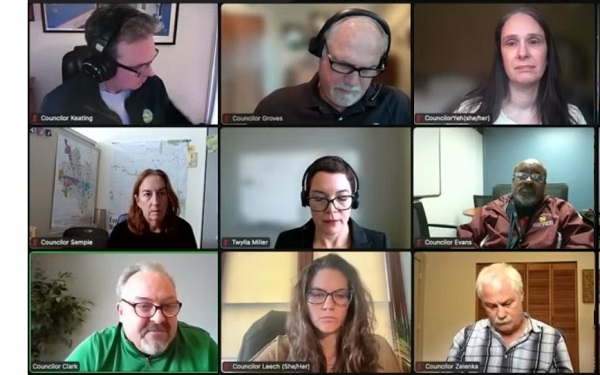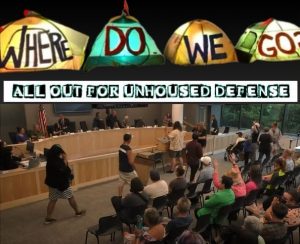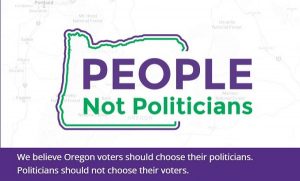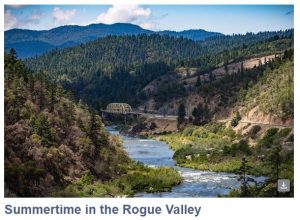City council to discuss bond measure for new Emeralds stadium
8 min read
With a budget gap expected to hit $13 million, and a baseball team that needs a new home, city staff suggest three big ways to boost revenue. On Oct. 11:
Twylla Miller (Eugene CFO): I’m Twylla Miller, your chief financial officer. As we’ve discussed previously, expenditure growth is outpacing revenue growth.
[00:00:19] Property taxes make up about 70% of general fund revenues, and our existing property tax revenue growth is capped. Meanwhile, other revenues have generally remained flat.
[00:00:28] Meanwhile, expenditures continue to grow at a faster pace due to higher wage pressures and PERS (Public Employees Retirement System) rate pressures. Inflation and the cost of services, construction, and fuel all remain elevated.
[00:00:41] In addition, we’ve been funding downtown and unhoused services with one-time funding, including American Rescue Plan or ARPA funds.
[00:00:48] The adopted budget included a range of reductions, revenues, and then also repurposing of existing funding. Even with these reductions… I anticipate the gap growing to $13 million plus as we incorporate higher expenditure pressures and revenues remain relatively flat.
[00:01:06] As staff were considering the short-term funding gap this biennium, three revenue options emerged: a city service or utility fee, a restaurant tax, and then also general obligation bonds for capital projects.
[00:01:18] City service or utility fees: several jurisdictions utilize this revenue option on their monthly utility bills for street and sidewalk maintenance, transit operations, urban forestry, and police and fire services.
[00:01:30] The city of Salem has a city operations fee to continue existing emergency, library, parks maintenance, social, and other essential services. This is a flat fee collected through city utility bills.
[00:01:43] There are three cities in Oregon with a restaurant tax (Ashland, Yachats, and Cannon Beach). And while staff understand the complexities with this revenue source, it can raise a significant amount of revenue. And it also captures revenues from visitors to the area.
[00:01:55] The current conversation around the multi-use facility at the county for the Eugene Emeralds—bonds and a restaurant tax are considered options to provide a higher level of funding to meet the requests.
[00:02:07] The city could issue bonds towards this project, and if the bond (around $15 million as currently proposed) were issued as a voter-approved general obligation bond, it shouldn’t affect our credit rating with our rating agency.
[00:02:20] If the council wishes to place a measure on the muni(cipal) ballot in May, whether it be a bond or some other mechanism, action would need to be taken this February.
[00:02:31] John Q: Councilors praised staff work on revenue sources.
[00:02:35] Twylla Miller (CFO): The staff team included Amanda Nobel Flannery and Anne Fifield from Planning and Development, Ian Penn and Lacey Risdal from Public Works, Kacia Edison and Sue Cutsogeorge from Central Finance, Chief (Mike) Caven and Assistant City Manager Matt Rodrigues, as well as many other staff throughout the organization who answered questions and provided expertise in their areas.
[00:02:59] Councilor Mike Clark: I understand clearly that we have a short-term issue that needs to be dealt with. But I think our larger problem is long-term. We have a system where the revenues flow almost entirely from the quantity and the value of property. And we’ve decided not to add more. We have decided to grow more densely.
[00:03:22] And that 2% revenue growth versus 4.2% expense growth, I think, is a structural issue that comes in part from where we get most of our money, and the fact that a lot of people are moving here. Our population is growing, but not at the same rate that our property amount and value is growing.
[00:03:45] I would think some of our most critical goals would want to look at: How do we increase the value of property that’s already in the city? And how do we grow the amount of property that’s subject to property taxes in the city?
[00:04:00] I think the real solutions for the long term here involve increasing the size of the pie rather than arguing over the slices.
[00:04:09] I’d like to see us for the long term focusing on not increasing tax rates, but increasing taxpayers—the number of them—with economic development as Randy Groves has talked about turns properties that perhaps don’t pay as much into thriving businesses that do. And new homes that are constructed pay more in property taxes as well.
[00:04:32] There’s also 22,000 people who live in River Road and Santa Clara who live in the city but don’t live in the city, because they don’t pay city of Eugene property taxes. And I think we should never force them to annex into the city, but I do think we should be working harder to invite them to voluntarily join and become members of this, and a part of the solution with our tax base.
[00:04:57] I think there are attractive ways to offer that to people and see more tax money coming in from that area into city coffers.
[00:05:05] So I really hope we’re going to develop solutions that deal with that long-term structural imbalance as we look at the short-term needs as well.
[00:05:16] Councilor Emily Semple: I saw at the bottom of the restaurant page of the other cities, a 5% on prepared food, and that causes me to gasp because anybody on SNAP (Supplemental Nutrition Assistance Program) is allowed to buy prepared food as long as it’s not hot and that would certainly affect how much they get to eat.
[00:05:37] John Q: Councilor Matt Keating suggested new fees.
[00:05:39] Councilor Matt Keating: I remain enthusiastic about exploring a sweetened beverage tax…
[00:05:43] I’ve been longing for a delivery truck fee. Seeing a significant spike in Amazon being used as a primary source of home shopping or purchasing, there’s an increase of delivery trucks, whether it’s FedEx or UPS or other utilizing our streets. That could be directed toward street repair, traffic calming, or improving our roads.
[00:06:07] An Airbnb service fee, largely taxing the out-of-state or out-of-area user, to go toward our affordable housing trust fund could help the imbalance in our community significantly.
[00:06:23] And I didn’t see on here, and it was an idea that came from Greenhill last budget cycle, and that was an increase in animal licensing fees.
[00:06:35] City Manager Sarah Medary: We didn’t include most of the fees that we already have in place. And you might remember that our budget actually includes quite a bit of fee increases for a number of our services. So we’ll write that down to make sure we’re revisiting it, but that is something that is already in consideration, so that’s why you didn’t see it.
[00:06:55] Councilor Randy Groves: Move to schedule a work session as soon as possible to discuss the potential of referring a capital bond to the voters that would support the construction of sports facilities in Eugene, such as a multipurpose stadium, regional pickleball courts, and sports fields at Golden Gardens, and direct the city manager to provide the council work session with financial information options and other information she deems relevant regarding a potential bond measure. (Second.)
[00:07:20] My intent is to bring this to a public discussion. We have a lot of people in the community we’ve been hearing from, they expect us to look at this and weigh in on it.
[00:07:32] Councilor Jennifer Yeh: I received my first email about this pickleball situation and the city giving money yesterday. So I’m surprised that the very next day we’re talking about giving them money through a bond measure. I’m sure it’s obvious I’m a little grumpy about it.
[00:07:46] This is the second project where we’re being asked for money before any amount of acceptable level of information has been given to us. And, like the Ems, I don’t feel like this council should be asking for money or dedicating money to something we don’t fully understand.
[00:08:05] So, in this work session, if we don’t have that information about the multiuse center, about this pickleball situation, I can’t support it. And I don’t think any of us should. If we don’t have answers to questions, then we shouldn’t ask taxpayers to give us money for things. I just feel very uncomfortable. I think it’s totally unacceptable.
[00:08:26] Councilor Matt Keating: …To put city funds toward pickleball is a head-scratcher. I would like us to entertain concepts that can boost or bolster the footprint for health and wellness throughout our community. And if it has to include pickleball, then, I may hold my nose in support if there are investments in bike safety, if there are investments in bike security, if there are opportunities for perhaps more dog parks, and if there are opportunities to invest in youth sports and not a sport that is pretty lopsided, attracting a demographic that isn’t exactly the future of the city of Eugene.
[00:09:11] Councilor Emily Semple: I will point out that although we haven’t heard about pickleball until quite recently, some months ago, a year ago, we were being lobbied to support pickleball, which I think has a broad interest across the community and certainly is a benefit for health.
[00:09:29] And I’d like to point out we’re only voting to have a work session not to have a bond. And it does seem to have some urgency due to the Ems being anxious, and I don’t know how we would fund that. I don’t know how much support it has across the broad community. We certainly know there’s a lot of baseball fans. So I think if we were going to support a stadium, it would be appropriate to get the input of the entire city.
[00:09:58] But we’re not asking for that yet. In the work session, I’m sure we’ll talk about the different things that we like for health and baseball. I’m willing to go forward with the discussion.
[00:10:10] Councilor Randy Groves: I understand people’s concerns, colleagues’ concerns on this. That’s the purpose of the work session, is to get more information and to have an understanding, and the multiuse stadium is, for me, kind of the key piece to look at, but what other needs do we have around health and fitness and low-cost community activities, was kind of my thought.
[00:10:31] But, again, I don’t even know exactly where I am on some of these issues either. That’s what the work session is for.
[00:10:37] John Q: Staff shares new revenue options: service fees and a restaurant tax. And with the Emeralds asking the city for about a third of the $43 million needed to stay in Eugene, the council asks for more information about a potential bond.




